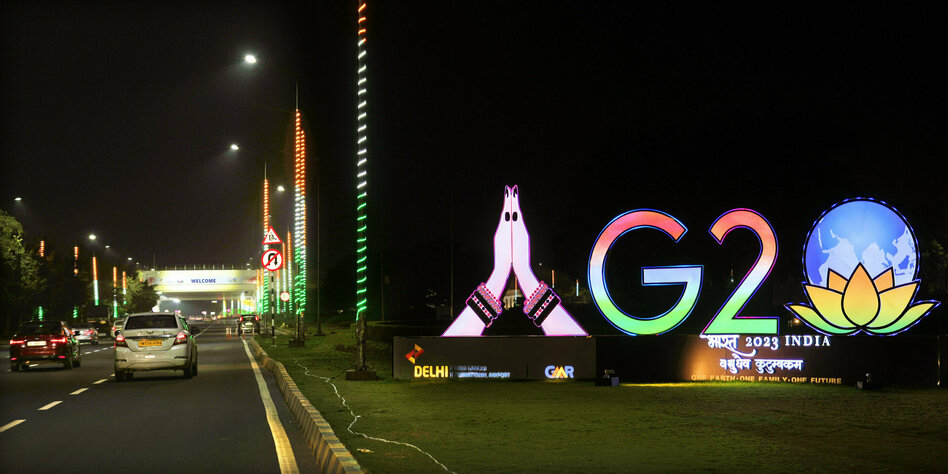The success of the G20 is measured by how they deal with Russia’s war of aggression. A joint final declaration is important, says Claudia Schmucker.
Advertisement for a summit in New Delhi Photo: Manish Swarup/ap
taz: Ms. Schmucker, what is the significance of the G20 in the newly formed world order and many other alliances such as Brics Plus?
Claudia Schmucker: Very large. The G20 is the only club where developing countries, industrialized countries and aspiring developing countries sit at the same table and discuss matters on an equal footing.
Claudia Schmuckerheads the Center for Geopolitics, Geoeconomics and Technology DJAP. He leads the Globalization and World Economy program until 2020.
But the G20 couldn’t decide anything.
The G20 can set the agenda and commit to taking action. But in the current tense geopolitical situation, the G20 exists mainly to create more understanding with each other, defuse conflicts, and have conversations with each other constructively. Last year, American President Joe Biden and Chinese President Xi Jinping met on the sidelines of the summit in Bali.
How serious is Xi’s rejection this year?
The Bali Summit was successful because it was able to agree on a joint statement regarding Russia’s war of aggression and condemning it. You can’t come back from that. If Xi does not come, it may mean he is no longer willing to support this kind of declaration. This is a big problem for the G20 and also for India as the host. This cancellation is also an insult to India.
Will the G20 Summit fail without a joint final declaration condemning Russia’s war of aggression?
The success or failure of the G20 Summit will be determined by how the G20 responds to Russia’s war of aggression. Of course, there is a long agenda regarding climate, economy and development. These topics are also being worked on. But we won’t be able to agree on major progress until we talk about Russia’s war of aggression and find agreement there.
And you’re skeptical?
Yes. But of course I hope it works.
What can Western countries do to make this summit a success?
When the presidents of China and Russia do not take part, the burden on the EU and the United States will be even greater. The countries of the so-called West now have the task of reaching out to developing countries and presenting our agenda for a multipolar world order.
What does the West have to offer?
On the one hand, continuous support, for example in building infrastructure. Second, we must be ready to face the reform of international organizations such as the International Monetary Fund, World Bank or UN. The EU should work to ensure that developing and developing countries are better represented there. China has now managed to win over these countries by offering them an alliance against “US hegemony”. The third important point is debt relief. To do this, you need China as a partner.
The G20 is expected to decide to recognize the African Union as a permanent member. A good move?
This is long overdue. Apart from South Africa, no African countries are members of the G20. Adding a regional organization representing several African countries would be a big step.
Can the new Brics Plus format with countries from Argentina to Saudi Arabia, heavily dominated by China and Russia, develop into competition with the G20?
This expansion is primarily a strong symbolic signal. But there are almost no issues that make these countries look united, other than opposing US hegemony and demanding more representation in international organizations. They pursue different economic, diplomatic and political goals. India, for example, is moving closer to the West and its ties with the US are closer than ever. And the EU has also launched a charm offensive against India.

“Subtly charming web junkie. Unapologetic bacon lover. Introvert. Typical foodaholic. Twitter specialist. Professional travel fanatic.”







